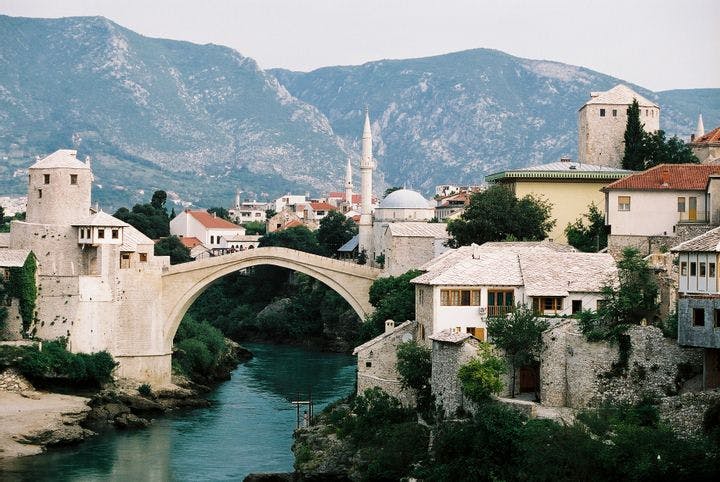Fall 2007
A Road Trip Through History
– Martin Walker
Martin Walker on Geert Mak's European travels.
In the year before the millennium, Dutch journalist Geert Mak traveled through Europe in a small van furnished with a mattress and a hotplate, on one of the world’s most thoroughly depressing journeys. His lively yet erudite account of the continent’s preceding century of wars, genocides, and gulags, and of its subsequent recovery, originally published in daily installments in the pages of Holland’s NRC Handelsblad newspaper, has become a bestseller across Europe.
The chapter titles trace Mak’s itinerary of grief and misery. He commemorates World War I at Ypres, Verdun, and Versailles, and World War II at Dunkirk, St. Petersburg, Vichy, Stalingrad, Monte Cassino, Dresden, and Auschwitz. To mark the 20-year truce between those two wars against German ambition he visits Guernica, Mussolini’s birthplace at Predappio, Hitler’s holiday spot in Berchtesgaden, and Winston Churchill’s country house at Chartwell. At each stop Mak digs up historical documents, conducts interviews, and makes his own shrewd observations,producing a rumination that blends diary, travelogue, and popular history.
In recalling the Cold War, Mak unaccountably avoids Yalta, scene of the 1945 meeting of Churchill, Joseph Stalin, and Franklin Roosevelt, where the contours of postwar Europe began to congeal. Instead, he visits the scenes of the three doomed revolts against Soviet domination—East Berlin in 1953, Budapest in 1956, and Prague in 1968—and then the Gdansk shipyards, site of the Polish Solidarity movement’s formation, with happier results, in 1980. Then on to Chernobyl and Srebrenica and Sarajevo, where the history of Europe’s suicidal 20th century comes full circle. In one of those coincidences too remarkable for anything but real life, the century of European disaster that began with the assassination of the Austrian archduke Franz Ferdinand in Sarajevo in 1914 ended in the 1990s with the Serbs’ dreadful siege of that same city. In the intervening years, Europe had changed beyond recognition. “European unification was—and is—above all a unique peace process,” Mak writes. More than that, it has become an economic miracle, spreading prosperity along with peace wherever the paternalistic arm of the European Union bureaucracy may reach. In his travels of 1999, Mak was struck by the poverty of much of Eastern Europe as it underwent the transition from communist inefficiency. Seven years of growth later, the old Warsaw Pact lands are enjoying a boom. Having joined the European Union with a per capita income that was less than a third the EU average, these countries have incomes now above 60 percent of the average and rising fast.
In fact, today’s Europeans live rather well. “Europe still cannot hold a candle to the dynamism, flexibility, and energy of American society,” Mak notes, “but when it comes to quality of life the average citizen of the Old World—particularly its western regions—has quietly left his American cousin in the dust.” Citing such yardsticks as life expectancy, vacation time, social security and retirement, public health, and transportation, he concludes that America “is no longer Europe’s shining example.” But Mak’s review of Europe’s self-inflicted disasters leaves him nervous about the future. He cites the forebodings of veteran Luxembourg premier Jean-Claude Juncker, who mourns the way the British, the French, and others have managed to block the EU from becoming a single federal superstate. “I don’t think the generation after us will be able to put together all those national biographies in such a way that the EU will not be split back into its national components—with all the dangers that entails,” Juncker has said. And in much of Europe, Mak fears, democracy is “a fairly recent phenomenon and hardly to be taken for granted.” Further, “there is no European people.
There is no single all-embracing community of culture and tradition that binds together . . . the Northern-Protestant, the Latin-Catholic, the Greek-Orthodox, and Muslim-Ottoman.” And so Mak returns us to the importance of Sarajevo. Europe proved incapable of resolving the Balkan conflicts of the 1990s; once again, the United States had to intervene to settle a European war. And instead of signaling an end to wars of European nationalism, the siege of now predominantly Muslim Sarajevo from 1992 to 1996 may have been the opening salvo of a new confrontation between traditionally Christian Europe and the surging rival faith of Islam. As Mak reports, today the most popular name for newborn boys in Amsterdam, his hometown, is Mohammed.
* * *
Reviewed: "In Europe: Travels Through the Twentieth Century" by Geert Mak, translated by Sam Garrett, Pantheon, 2007.
Photo by Flickr/Kashfi Halford
